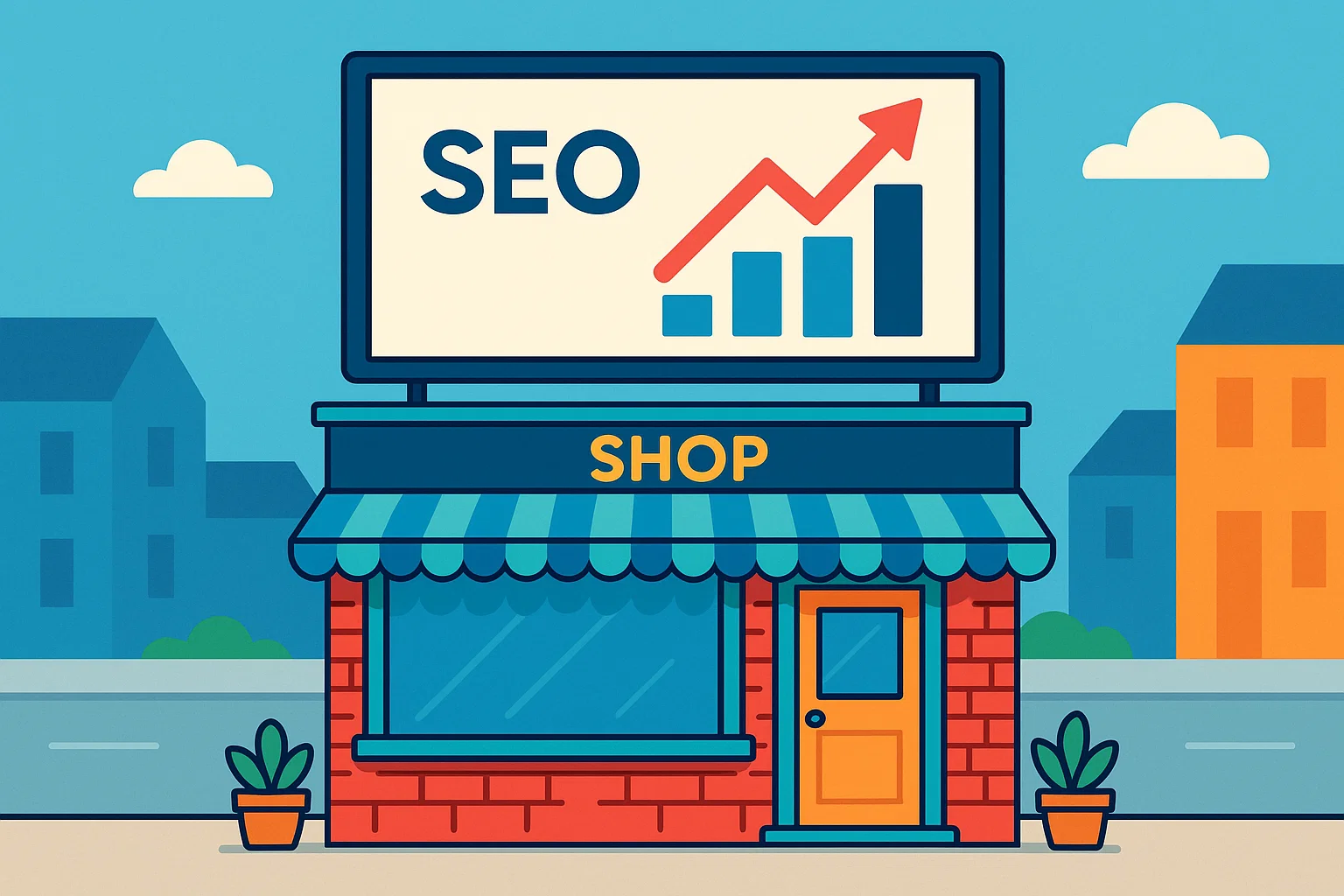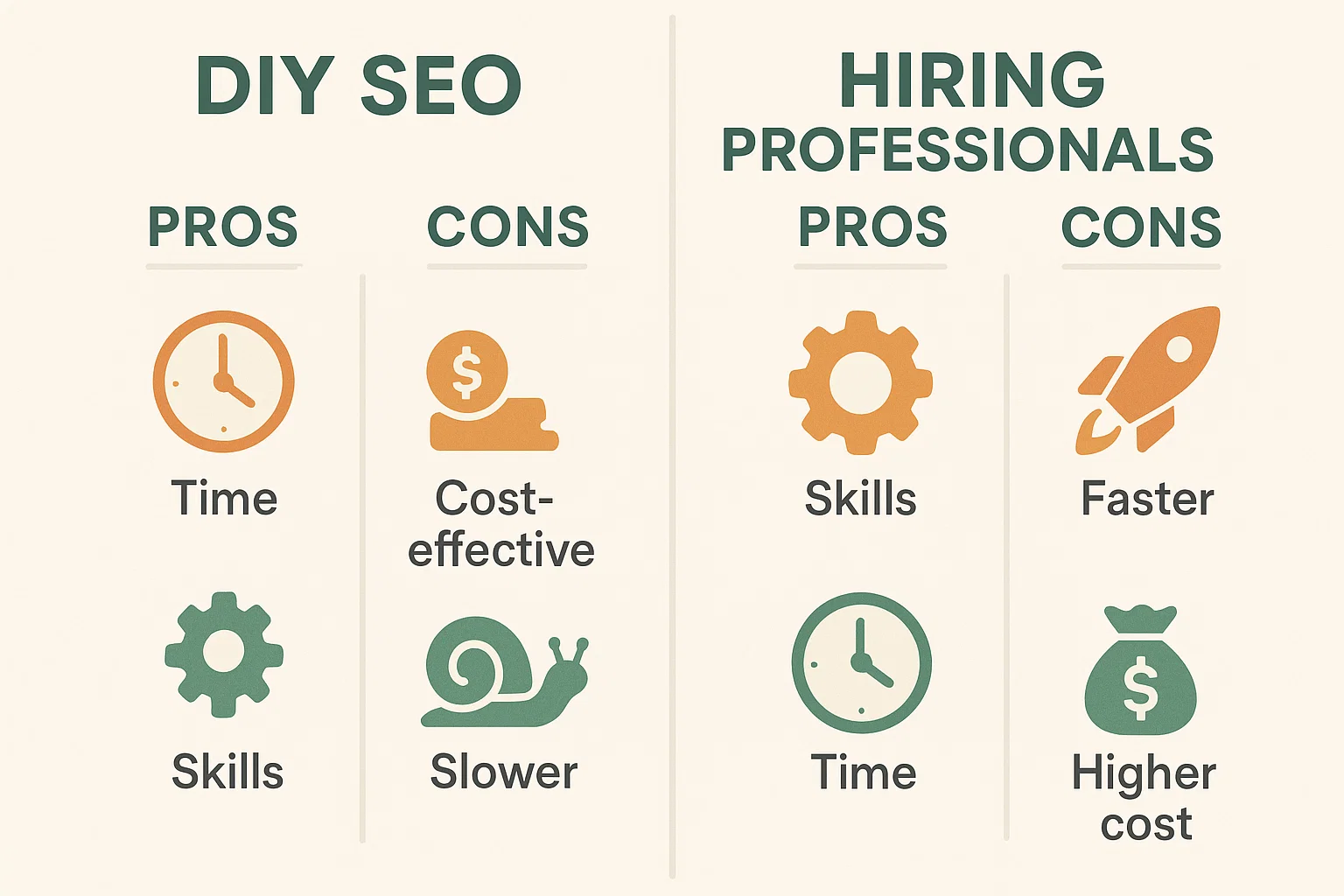Think of SEO (Search Engine Optimisation) as the digital signboard that points customers to your shop, website, or service page. For small businesses, getting SEO right can be the difference between a steady flow of customers and a website that collects digital dust.
This guide walks you through everything: why small businesses need SEO, the costs, the best tools, UK-specific tips, and how to choose the right SEO provider without getting ripped off.
Why Small Businesses Need SEO
SEO isn’t just for giant corporations with fat marketing budgets. In fact, small businesses often stand to gain more. Why? Because local customers are actively searching for products and services right in their area.
Imagine a family in Birmingham searching “best bakery near me.” If your bakery shows up on the first page, there’s a good chance they’ll visit you that same day. Without SEO, you’ll lose that customer to a competitor who invested in being visible.
SEO helps small businesses:
Compete with bigger brands by targeting specific niches or local areas.
Build credibility, customers trust websites that show up high in search results.
Save money long-term, unlike ads that stop when your budget ends, SEO keeps working.
Reach mobile users, with more than 60% of searches happening on phones, local SEO is golden.
So yes, if you’re wondering whether SEO really matters for small businesses, the answer is a loud, undeniable yes.
Does SEO Really Work for Small Businesses?
Let’s be honest: small business owners are rightly sceptical of marketing promises. You’ve probably been pitched by “SEO gurus” claiming they’ll get you to the top of Google overnight. That’s nonsense. But done properly, SEO does work.
Take this example: a small plumbing company in Leeds invested in SEO for six months. They started by fixing their website speed, adding service-specific landing pages, and setting up a Google Business Profile. Within a year, they were ranking for “emergency plumber Leeds” and doubled their bookings.
Another case? A café in London that added SEO-optimised blog posts about local coffee culture. Not only did they attract new visitors online, but travel bloggers started linking back to their website. Suddenly, they weren’t just a café; they were a landmark.
The bottom line: SEO isn’t magic, it’s a process. It takes time (3–6 months minimum), but once the momentum builds, the results keep paying off.
How Much Should SEO Cost for a Small Business?
Ah, the big question. How much does SEO actually cost for small businesses, especially in the UK? There’s no single price tag because costs vary based on the size of your website, the competition in your industry, and whether you want local or nationwide reach.
Here’s a realistic breakdown:
Hourly SEO Rates
Freelancers in the UK: £30–£100/hour
Agencies: £50–£150/hour
This is good if you only need small fixes like keyword research or a site audit.
Monthly SEO Packages
Small business starter packages: £300–£700/month
Medium competition industries: £700–£1500/month
High competition (law firms, real estate, finance): £1500–£3000/month
Monthly packages usually cover keyword targeting, blog optimisation, backlink outreach, and Google Business management.
One-Off SEO Projects
Sometimes you don’t need ongoing SEO, you just need a website overhaul, technical fixes, or a new content strategy. These projects can range from £500 to £5000 depending on scope.
So, how much should you spend? A rule of thumb: invest 5–10% of your revenue into marketing, with a portion for SEO. For most small businesses, £500–£1000/month hits the sweet spot.
Which SEO Tool Is Best for Small Businesses?
You don’t need to buy every fancy tool under the sun. Start with the basics:
Google Search Console – free, shows how your site performs in search.
Google Analytics – free, tracks visitors and conversions.
SEMrush – paid, all-in-one SEO platform, great for keyword research.
Ahrefs – powerful for backlinks and competitor analysis.
Moz – beginner-friendly with useful SEO toolkits.
Yoast SEO or Rank Math (WordPress plugins) – easy way to optimise pages.
For small businesses just starting out, use free tools first. Once you see results and want to scale, invest in paid ones.
Local SEO Services for Small Business UK
If you’re a UK business with a physical location, local SEO is your goldmine. Here’s what matters most:
Google Business Profile – set it up, add opening hours, photos, and respond to reviews.
Local citations – get your business listed on directories like Yell, Thomson Local, or Yelp.
NAP consistency – your Name, Address, and Phone number must match everywhere.
Location-based keywords – e.g., “Manchester florist” instead of just “florist.”
Reviews – encourage happy customers to leave Google reviews. They boost rankings.
The goal is to appear in the Google Map Pack (those three results with maps). It’s prime real estate for small businesses.
DIY SEO vs Hiring Professionals
Here’s the tough decision: should you do SEO yourself or hire someone?
DIY SEO
Pros: Cheap, more control, learn valuable skills.
Cons: Time-consuming, steep learning curve, risk of mistakes.
DIY works if you’re tech-savvy, have time to learn, and are okay with slower results.
Hiring Professionals
Pros: Faster results, expert strategies, saves you time.
Cons: Costs money, quality depends on who you hire.
Hiring makes sense if you’d rather focus on running your business while someone else handles the technical side.
Best Practices for Small Business SEO in 2025
SEO evolves constantly, but these practices remain solid:
Mobile-first design – if your site isn’t mobile-friendly, you’re losing half your visitors.
Quality content – blog posts, guides, and product descriptions optimised for users, not just search engines.
Backlinks – aim for links from local blogs, directories, and news sites.
AI-powered SEO – tools now help with keyword clustering and content suggestions.
Voice search optimisation – more people use Siri, Alexa, or Google Assistant.
Pro tip: Don’t obsess over algorithms. Write content that actually helps your customers. Google rewards that.
Choosing the Right SEO Service Provider
Sadly, the SEO world has its fair share of scams. Here’s how to protect yourself:
Avoid guarantees – no one can promise #1 rankings.
Check case studies – a good agency will show real results.
Ask about strategy – if they’re vague, run.
Look for transparency – monthly reports should be clear.
Start small – test with a smaller package before committing long-term.
In the UK, you’ll find agencies from London charging premium rates, but smaller regional agencies (Manchester, Birmingham, Leeds) often offer great value.
Building Long-Term SEO Success
SEO isn’t a quick win, it’s an investment. But for small businesses, it’s often the most reliable way to compete with larger brands without breaking the bank.
Focus on local visibility, steady growth, and genuine customer engagement. Whether you decide to DIY or hire pros, the important thing is to start now. Six months from today, you’ll either be celebrating your new flow of customers, or still wondering if SEO works.
And trust me, it does.

Rachel combines her technical expertise with a flair for clear, accessible writing. A graduate of the University of Edinburgh, she specializes in creating detailed tech-focused content, Govt Jobs, Payslips that educates our readers about the latest in web development and SEO tools at Spinbot blog.


